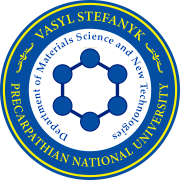The major direction of the scientific activity of the Material Science and New Technology department (Physical-Technical Faculty Vasyl Stefanyk Precarpathian National University, Ivano-Frankivsk, Ukraine) is the development of new functional material with the specific foreseen properties.
Investigations are carried out in the following areas:
Porous carbon materials and composite materials
Achievements: Methods for nanoporous carbon obtaining from the raw materials of plant origin have been developed. The nanoporous carbon high specific surface area and optimized physical and chemical properties allow using it as an high performance electrode for electrochemical capacitors. The specific capacity of the material is 180 -200 F/g in 30% aqueous solution of KOH and 60-80 F/g in non-aqueous electrolytes.
Really very good results in the branch of nano- and mesoporous carbon obtaining with predicted pore size distribution for supercapacitor application.
Good results for MoS2/carbon nanocomposite synthesis with different morphology (multilayer nanospheres, nanosheets ).
Prospects: the development of nanoporous carbon with predicted morphology for supercapacitor; MoS2/carbon multilayer nanospheres using as motor oil additive, solid lubricant, catalytic applications.
Electrode materials for lithium power sources based on the metal oxides, and hydroxides, spinels. Electrode materials for lithium power sources based on the LiFePO4 and FeF3
Achievements: Complete experimental study of the correlation between synthesis conditions and structural, morphological and electrochemical characteristics of nanodispersed oxides
Synthesis of nanodispersed LiFePO4 with defined morphology (lamellar) and composite LiFePO4 / carbon with next testing as cathode in lithium cells. Good results in nanodispersed iron fluorides obtaining. Interesting results for mesoporous iron oxides and fluorides.
Prospects: The development of multipurpose functional nanomaterials synthesis based on the Ti, Fe(good results), Si, Mg, Zn oxides.
We are ready to cooperate in these areas and will consider all proposals that will be on your part.
Our advantages – excellent skills and experience in the field on materials testing by XRD, Mossbauer spectroscopy, low temperature gas adsorption, thermal analysis.
